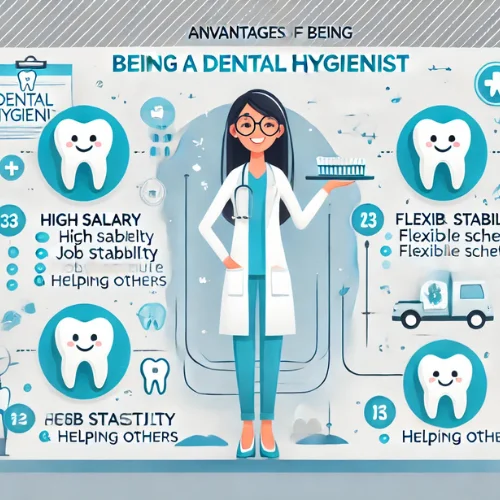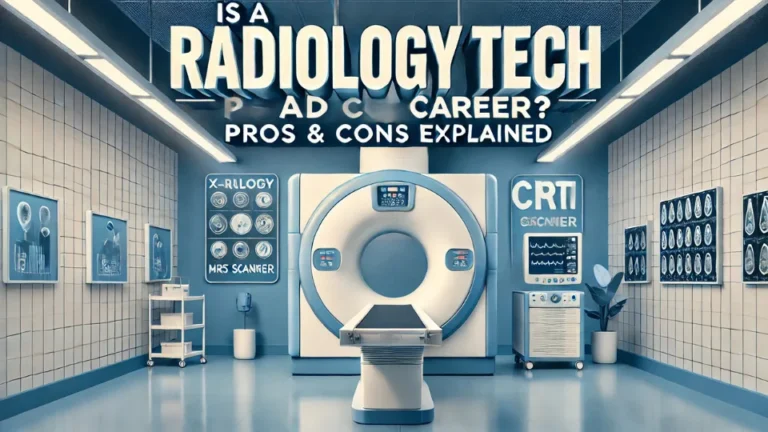Is a Dental Hygienist a Good Career? Pros & Cons Guide

Choosing a career is one of the most important decisions in life. A dental hygienist is a healthcare professional specializing in preventive oral care, assisting dentists, and educating patients on proper oral hygiene. This field offers many benefits, including job stability, good salary potential, and work-life balance. But is becoming a dental hygienist the right career choice for you? This article explores the various aspects of this profession, including job responsibilities, salary expectations, work environment, required education, career growth, and potential challenges.
Job Responsibilities of a Dental Hygienist

What Does a Dental Hygienist Do?
Dental hygienists play a crucial role in maintaining oral health. Their primary responsibilities include:
- Cleaning patients’ teeth by removing plaque, tartar, and stains.
- Applying fluoride treatments and sealants to prevent cavities.
- Conducting oral health assessments and reporting findings to dentists.
- Taking and developing dental X-rays.
- Educating patients on proper brushing, flossing, and diet choices for oral health.
- Assisting dentists during certain procedures.
Education and Training Requirements

What Are the Educational Requirements?
To become a dental hygienist, you need to complete a dental hygiene program accredited by the Commission on Dental Accreditation (CODA). Most dental hygienists earn an associate degree, which takes about two to three years to complete. Some pursue a bachelor’s or even a master’s degree for advanced roles.
Licensing and Certification
After completing an accredited program, aspiring dental hygienists must pass the National Board Dental Hygiene Examination (NBDHE) and a state or regional clinical exam to obtain a license. Licensing requirements vary by state, so it’s important to check the specific requirements where you plan to work.
Salary and Job Outlook

How Much Do Dental Hygienists Earn?
The salary of a dental hygienist depends on factors such as location, experience, and work setting. According to the U.S. Bureau of Labor Statistics (BLS), the median annual wage for dental hygienists is around $80,000. Those working in metropolitan areas often earn higher salaries than those in rural locations.
Job Demand and Future Growth
The demand for dental hygienists is expected to grow in the coming years. The BLS projects a 9% job growth from 2021 to 2031, which is faster than the average for all occupations. This growth is driven by an aging population that requires more dental care and increased awareness of the importance of oral health.
Work Environment and Job Flexibility

Where Do Dental Hygienists Work?
Most dental hygienists work in private dental offices. However, they can also be found in:
- Public health clinics
- Hospitals
- Schools and universities
- Nursing homes
- Research facilities
Work Schedule and Flexibility
One of the major advantages of this career is its flexibility. Many dental hygienists work part-time, allowing them to balance their personal and professional lives. Full-time positions are also available, often offering benefits such as health insurance, paid time off, and retirement plans.
Advantages of Being a Dental Hygienist

Why Choose a Career as a Dental Hygienist?
There are several benefits to choosing this career path, including:
- High Salary Potential: Competitive pay without requiring a four-year degree.
- Job Stability: High demand ensures consistent employment opportunities.
- Work-Life Balance: Flexible schedules allow for personal time.
- Helping Others: The ability to make a positive impact on patients’ health.
- Shorter Educational Path: Compared to dentists, dental hygienists spend less time in school.
Challenges of Being a Dental Hygienist
What Are the Downsides?
While this career has many advantages, there are some challenges to consider:
- Physical Strain: Dental hygienists spend long hours standing or bending over patients.
- Risk of Exposure: Potential exposure to infections, requiring strict hygiene practices.
- Repetitive Tasks: Cleaning teeth and educating patients can become routine.
- Licensing Requirements: The need for continuous education to maintain licensure.
Career Growth and Advancement Opportunities
Can Dental Hygienists Advance in Their Careers?
Yes! Dental hygienists can advance by:
- Pursuing a Bachelor’s or Master’s Degree: This can open opportunities in research, teaching, or public health.
- Becoming a Dental Hygiene Instructor: Teaching the next generation of dental hygienists.
- Specializing in Areas Like Pediatric or Geriatric Dentistry: Providing care to specific patient groups.
- Transitioning to Dental Sales or Consulting: Working with dental companies to promote products.
Frequently Asked Questions (FAQs)
1. Is it hard to become a dental hygienist?
Becoming a dental hygienist requires dedication, but the education and training process is shorter than many other healthcare professions. The coursework includes science subjects such as anatomy, physiology, and microbiology, which can be challenging but manageable with effort.
2. How long does it take to become a dental hygienist?
It typically takes two to three years to complete an associate degree in dental hygiene. Additional time may be required for licensing and certifications.
3. Do dental hygienists have to work weekends?
Some dental offices require weekend work, but many offer flexible schedules, including part-time and weekdays-only positions.
4. Can a dental hygienist open their own practice?
In some states, dental hygienists can open their own practices or provide services without direct supervision from a dentist. However, regulations vary by location.
5. What is the difference between a dental hygienist and a dentist?
A dentist diagnoses and treats oral health problems, while a dental hygienist focuses on preventive care, cleaning teeth, and educating patients.
Conclusion
A career as a dental hygienist is a rewarding choice for those interested in healthcare, patient care, and flexible work schedules. It offers competitive salaries, strong job demand, and the opportunity to help others maintain their oral health. However, it also comes with challenges such as physical strain and repetitive tasks. Overall, if you are passionate about oral health and enjoy working with people, becoming a dental hygienist can be a fulfilling and financially stable career path.






